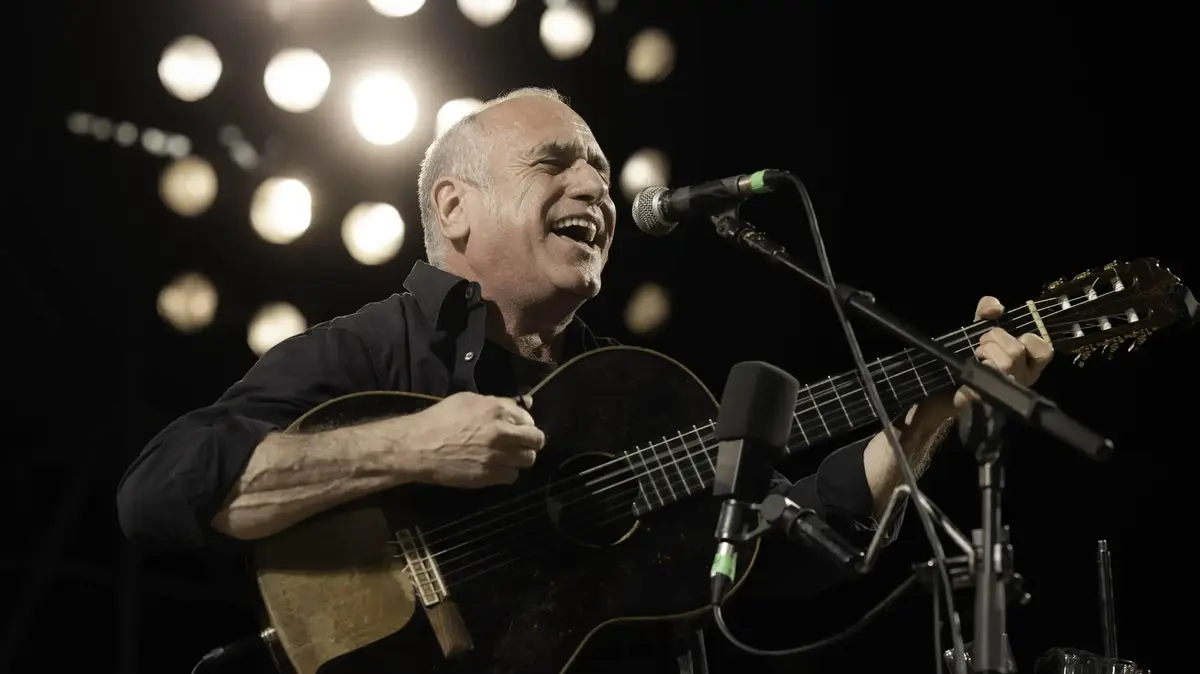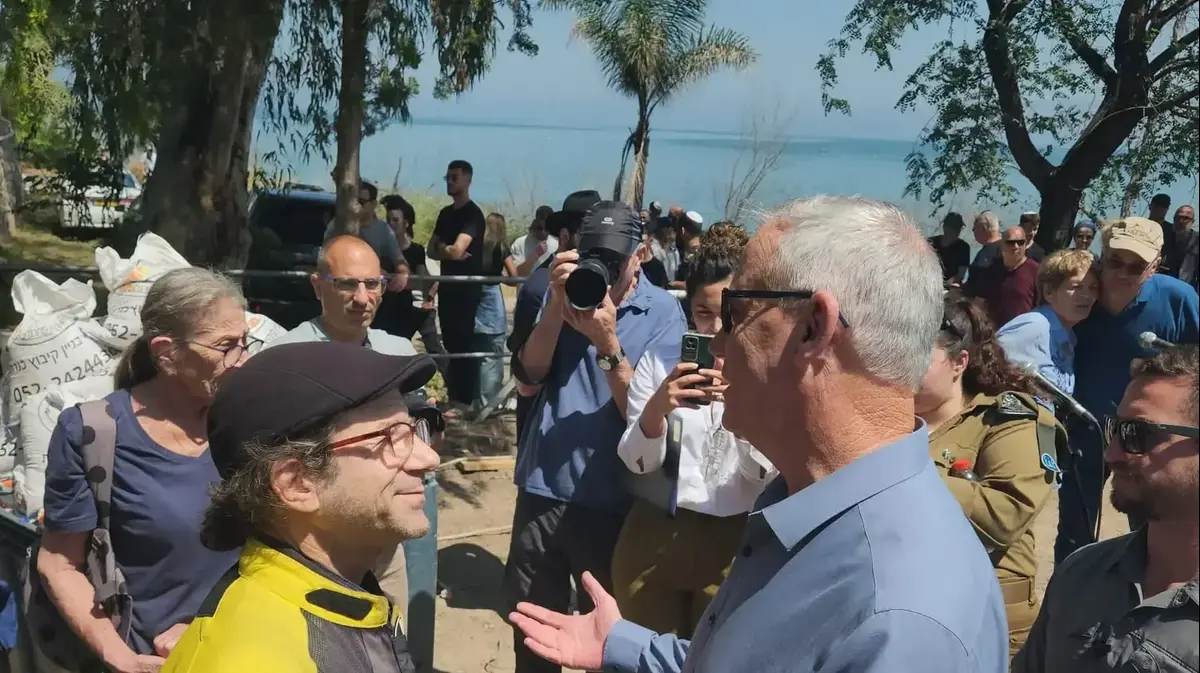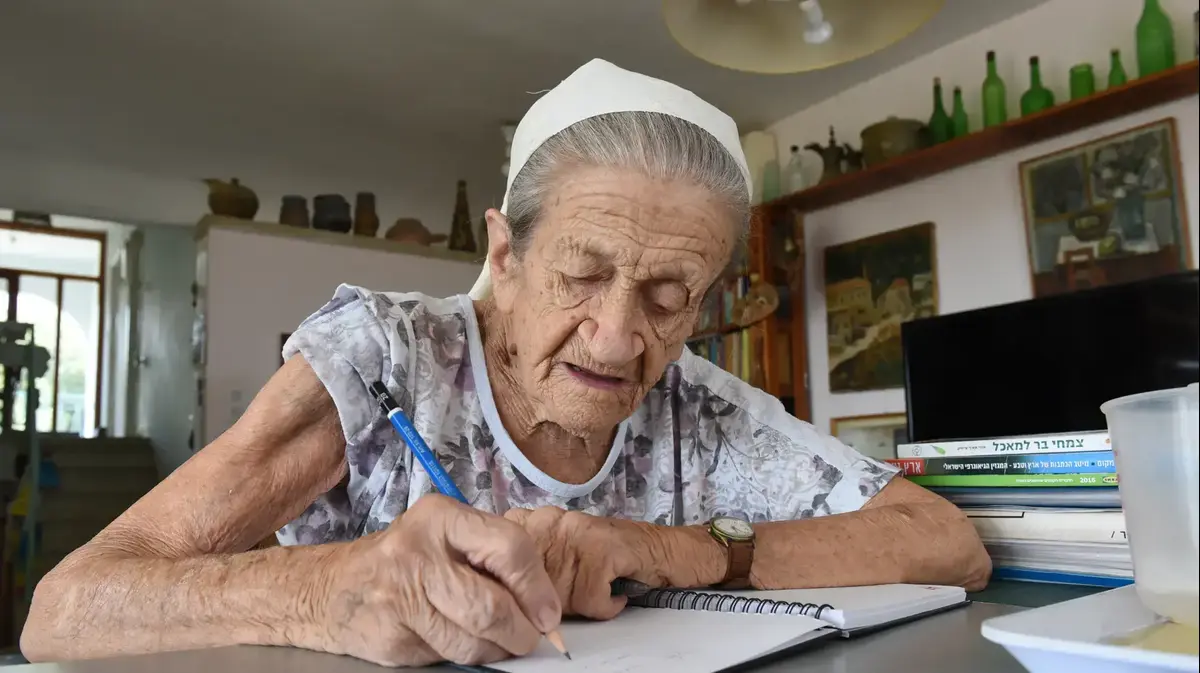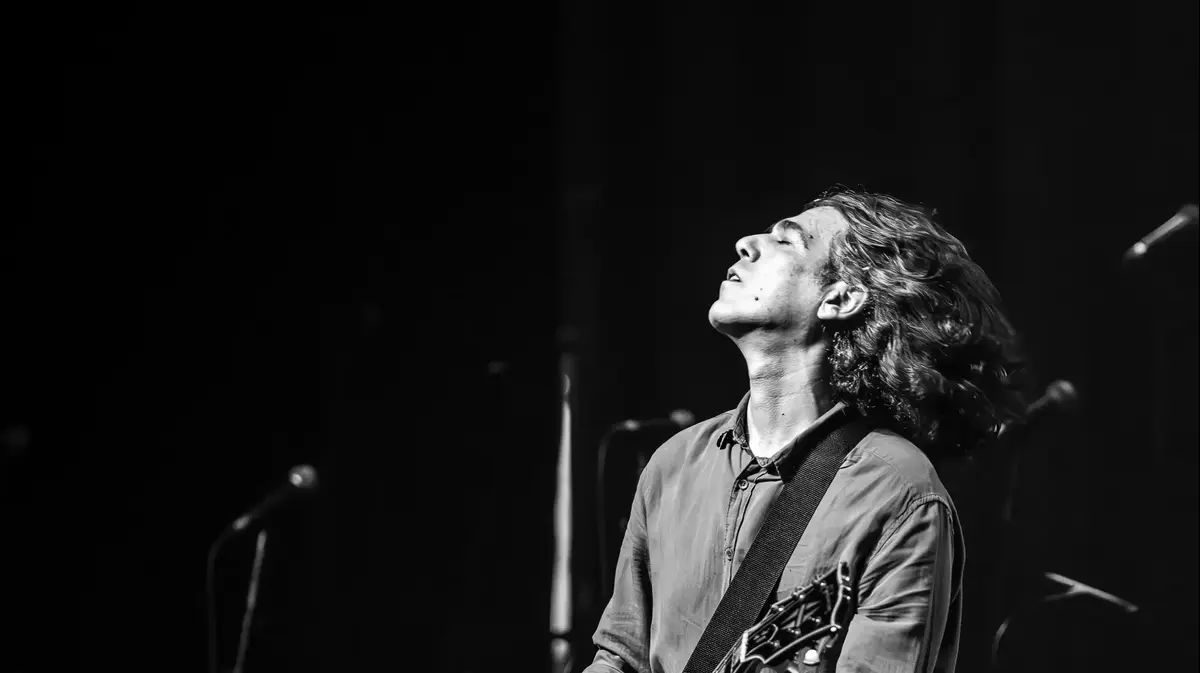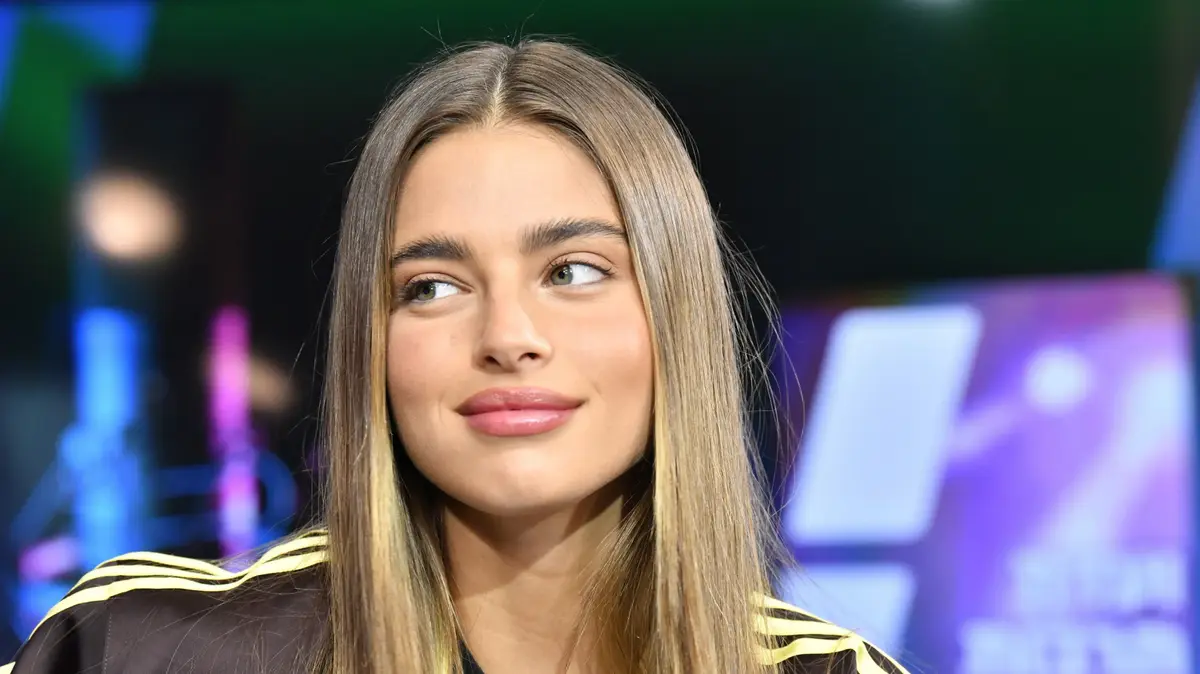Every other evening we would grin cynically at the peace songs.
In this show we felt how authentic it is
Timna Park hosted the "Pigeon Song Festival" this weekend, with a tribute to the mythological Nuweiba Festival and a joint concert for an Israeli and Moroccan orchestra.
Along with many exciting and optimistic moments, there were also some carelessness of politicians, who apparently have not yet learned to give respect to the world of culture
Living Room Fellow
06/03/2022
Sunday, 06 March 2022, 07:47 Updated: 08:07
Share on Facebook
Share on WhatsApp
Share on Twitter
Share on Email
Share on general
Comments
Comments
Barry?
Berry Sakharof (Photo: Omar Keidar)
In Eilat, every taxi driver is a music critic.
"Which show did you say you were going to?", A kind driver asks me, and I tell him about the "Song of the Dove" festival, which holds a tribute to the Nuweiba Festival.
"Oh, yes, with Shalom Hanoch, I drove him once," he smiles at me.
"No, Shalom appears at another festival in the city," I am forced to contradict the disappointed driver, who continues to tell me about all the great artists who sat with him in the taxi, from Mininet to Matti Caspi.
"He's crazy about the corona now, eh?", He tells me, and I feel it's a good time to ask him to put on a mask.
Eilat is less than an hour's flight from Tel Aviv, but in many ways it is in a completely different book.
The weather is appallingly pleasant, the dry wind fights with the southern sun and creates a humanitarian corridor of sanity in the heart of the desert.
People do not wear masks here, they certainly do not ask for a green note anywhere and the talk of the day is not the war in Ukraine, but the incessant parade of musicians flowing into the city.
Utopia.
More on Walla!
Ian Anderson: "Judaism is not the only thing because of which Israel exists and because of which it will continue to exist"
To the full article
Hanan Yuval (Photo: Ziv Barak)
A different kind of utopia has been built in the past south of Eilat.
It has been 45 years since the blessed and short-lived tradition of the "Pop Festival in Neviot", named after the Jewish moshav established in Nuweiba, Sinai.
The 1978 festival has become a legend over the years.
It is customary to call it, with obvious reverence, the "Israeli Woodstock."
The amount of people was smaller, but the drugs, the free love and especially the sense of revolution in the air were the same.
Even Richie Havens, the same one who opened the big New York festival in 1969, was a guest on the show.
The corona hampered preparations, and Vladimir Putin ironically spiced up the timing of the festival with a peace sign (not including Shalom Hanoch, who blew in favor of another festival) but thousands of people found their way to Timna Park to recreate the magic of that festival off the coast of Sinai.
The audience was mostly adult.
There were no drugs there, everyone was also nicely dressed, and it is doubtful if loving couples were swept up in stormy sex in front of Solomon's pillars.
There are things that are hard to recreate.
The music, however, the organizers took care to preserve with great love.
How good it was there.
Zilber (Photo: Ziv Barak)
Hanan Yuval, who performed at the original festival, opened the show with "You Remember the Songs".
The audience remembered, and more how.
This small and simple performance enveloped the audience with nostalgia, but stood as a mirror image for a show that would begin immediately after.
Ariel Zilber, who like Hanan Yuval also starred in the original show in Nuweiba, was the only one to take the stage with his own band.
He performed the classic "Brosh", "That's how you wanted me" together with Shlomi Shaban and "Shemesh Shemesh" together with Berry Sakharof (if he insisted on reading "Barry").
The highlight of Zilber's short set was the song "Once Upon a Time I Was a Little Boy" written by Ehud Manor and Matti Caspi.
Zilber performed this song in front of thousands of young Israelis in Nuweiba in 1978.
It's a sour-sweet song that talks about the endless hope for peace.
Ehud Manor hinted in the last House that nothing will change in the peace sector until we change.
Ariel Zilber has changed, to say the least, since he originally performed this song.
It is amazing to see the sophisticated level of performance of Zilber, one of the greatest performers who have been here, who manages to change the whole tone of the song without changing a word or character from the original song.
Something in the bastard wink in the way he performed the chorus made the whole song feel cynical.
Almost out of place.
That's exactly why it's good that he's been there.
Guy Mazig and David Broza (Photo: Ziv Barak)
The show was replete with artists from a generation that did not know Nuweiba, who performed songs of their idols.
Guy Mazig performed Ephraim Shamir's "Correct and Beautiful", Rona Keinan and Esther Rada saluted Yehudit Ravitz with "Everyday Love" and Shlomi Shaban stepped into Danny Litani's big shoes in "Hot Attitude".
Not everything worked.
It's hard to go wrong with the Beatles' "Here Comes The Sun", but Esther Rada in a technical and banal performance managed to draw all the magic from it.
Even Yoni Rechter's choice to perform "Tears of Angels," one of the bigger songs written here - but also one of the most depressing - felt less in place within a happy pop festival.
But except for a few petty remarks, like the fact that Berry Sakharof's guitar (sorry, Barry) was not connected in a duet with Ariel Zilber, the show included some great moments of pleasure.
Among others, the duet of Rona Keinan and Shlomi Shaban for Shlomo Artzi's "A Man Gets Lost" (which in Nuweiba in general shocked the audience with a forgotten Hebrew performance for Stevie Wonder).
Shaban has become synonymous with original and sophisticated arrangements, but this time he chose, and rightly so, to faithfully perform the original piano opening of Moshe Levy.
Shaban later performed with Yoni Rechter on the latter's "Standard Love Song," the kind of thing they invented the piano for (search YouTube, this is not the first time they've performed this magic together).
Another star of the show was Carolina, who delightfully performed Shlomo Yidov's "White Days" and Matti Caspi's "I Didn't Know You Went Away from Me."
Without touching on the great lyrics of Leah Goldberg and Ehud Manor, Carolina managed to make a feminist spin on the songs.
"I did not know you would leave me" she chose to sing in masculine language, as originally, but it was hard to miss the cynical resonance of the words "how I will change" that the man promises.
Of course that will change.
Yoni Rechter (Photo: Ziv Barak)
Shalom Hanoch, who was the undisputed star of the original festival, stood out in his absence - but another guitar prince took his place at Timna when Barry Sakharof took the stage and performed Tammuz's "Silent Love."
This was a version that did a lot of respect to the original, with the roles of Shalom Hanoch and Yehuda Eder performed by their students: Sakharof and guitarist Doron Mizrahi who stood out throughout the evening (due diligence: one of my favorite people for more than 30 years).
In addition, Berry marveled at the chilling performance of Zvika Pick's classic "Gathered Tishrei," with all the right highlights of the throaty consonants, as God and Nathan Jonathan intended.
But the two biggest stars of the evening were the ones who also stood out in the original show: Dori Ben Zeev, who returned to the lead position, and David Broza, who was then a young singer at the beginning of his career.
Beyond the nostalgic jokes about the drugs they did in Sinai in the seventies, Ben Zeev bounced the audience, literally, in a performance for "And You Dance" and also in the joint performance with Peter Roth, the musical director of all this beauty, for the classic "Sun Blow" that Ben Zeev wrote for Yigal Bashan.
Broza closed the evening with a set in an exact dose of "Bedouin love song", "The most beautiful girl in the village", "The Boxer" by Paul Simon and of course, how can it be without "It will be good" written by Jonathan Geffen after Sadat's visit to Israel. Originally called "Song of Peace No. 349 / A", it was performed while the Egyptian consul was sitting in the audience in the audience. As much as "peace" is an ideal aspiration for sanity and normalcy. In the distance we saw a pretending city, and limestone stars covered the cars that began to make their way slowly out of the darkness of Timna, which one evening felt like at Mount Sinai. And maybe it was just a dream.
Carolina (Photo: Ziv Barak)
After the first evening, the festival people decided to raise the already high standard they had set for themselves.
The "Dove Song Concert" put the Jerusalem East and West Orchestra on one stage together with the Morocco Symphony Orchestra.
Dozens of musicians on one stage conducted by Tom Cohen, who is a rare mash-up of a classical conductor and a pogo stick.
The orchestras have won respectable reinforcement players such as Berry Sakharof, Ehud Banai, Dudu Tessa, Violet Salma, Sana Marhati, Lynette, Narkis and more.
The emphasis on "Look how beautiful Jews and Muslims can make music together" would have stood out in itself, and it could even have been nice if the large audience had not had to listen to half an hour of speeches including by Culture Minister Hili Trooper (to his credit) and President Yitzhak Bozi Herzog , Who despite his nice words about the peace on the way and the quotes of Yitzhak Rabin, chose to abandon the concert before the end in a disrespectful manner, to say the least.
It is hard to imagine the Queen of England or the President of the United States getting up in the middle of a concert, and that says something about the attitude of Israeli elected officials to culture
. And the development of the village and the Minister for the Development of the Periphery, the Negev and the Galilee.
It was a completely different show from the first evening, when instead of classic pop hits from the Hebrew repertoire, it was an evening of Arabic music for everything.
Even the few Hebrew songs performed such as Ehud Banai's "Black Work" or Berry Sakharof's "That's How It Is" have received new arrangements with much more than Arab touches.
Shlomi Shaban (Photo: Ziv Barak)
The show opened with a (relatively) short performance by Inta Omri, performed by Violet Salma, which was a kind of statement of intent for the entire evening.
Other records recorded in it were the performance of Leonard Cohen's Hallelujah in several languages by Sama Shufani, the duet of Sanaa Marhati and Narkis for "Lonely" and a particularly heartbreaking performance of "City of Refuge" by Ehud Banai and Ziv Yehezkel, dedicated to Ukrainian refugees.
It was a great connection of cultures.
Dudu Tessa performed the Iraqi hit Fog al-Nahal, a song previously performed by his grandfather.
Berry Sakharof performed "Drop of Luck" in Turkish with Lynette.
Ehud Banai, together with Sama Shofani, performed the Galilean ballad about the slave and Randora of George Samaan and Salem Darwish.
Arabic, Arabic, Jews, Muslims, Christians and everything in between.
The wonderful diva Sana Marhati was moved, and said in a mix of Hebrew, French and Arabic how excited she was to take part in such a show, in order to promote peace.
Her words were not very coherent, but everyone in the audience understood her when she finished her speech with clear words: "I made a kitchen salad."
This was true for the whole evening, which was a spicy combination of a lot of things that were not supposed to work together, but became a delicacy, even if there were some that burned in their butts and had to leave ahead of time.
culture
Tags
The dove song

